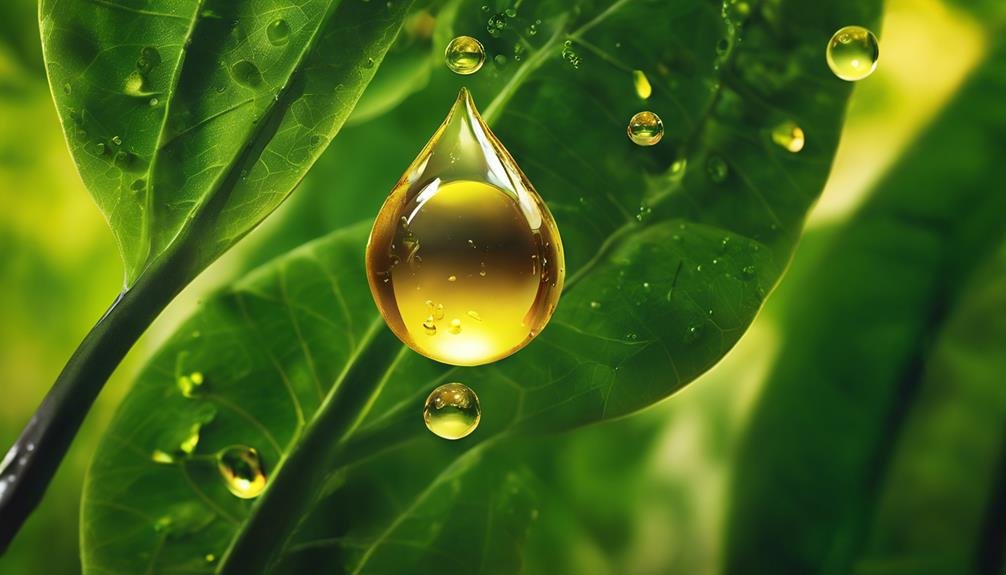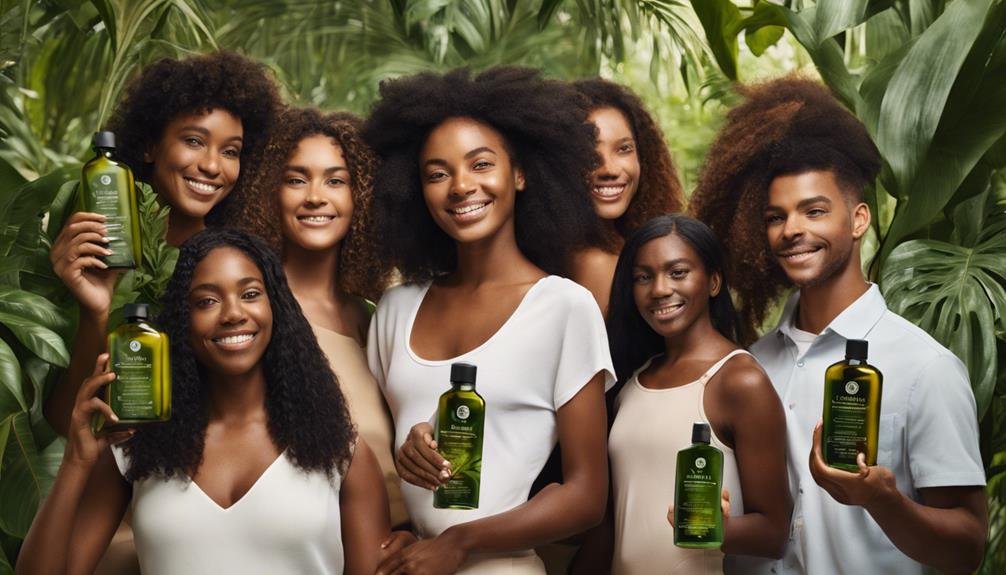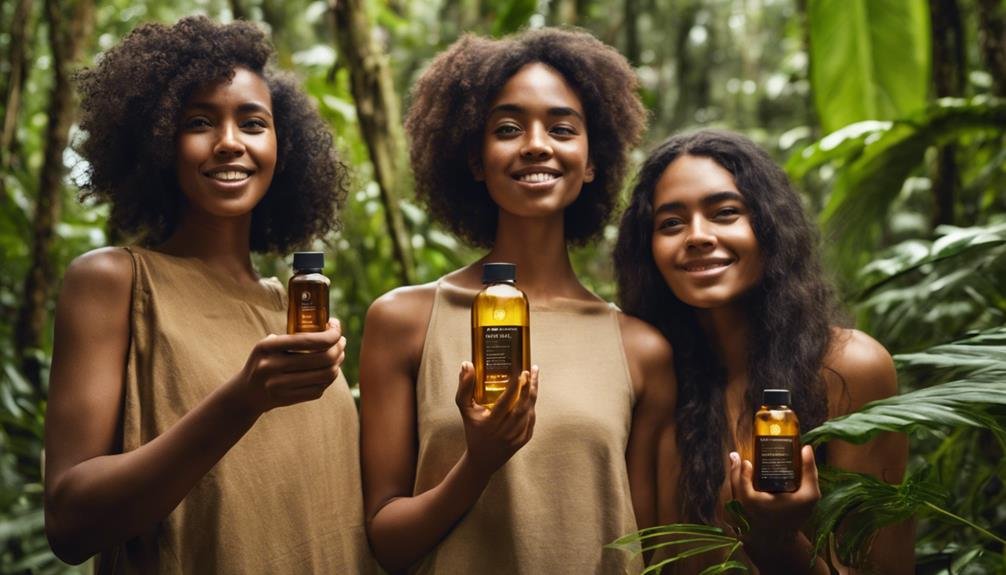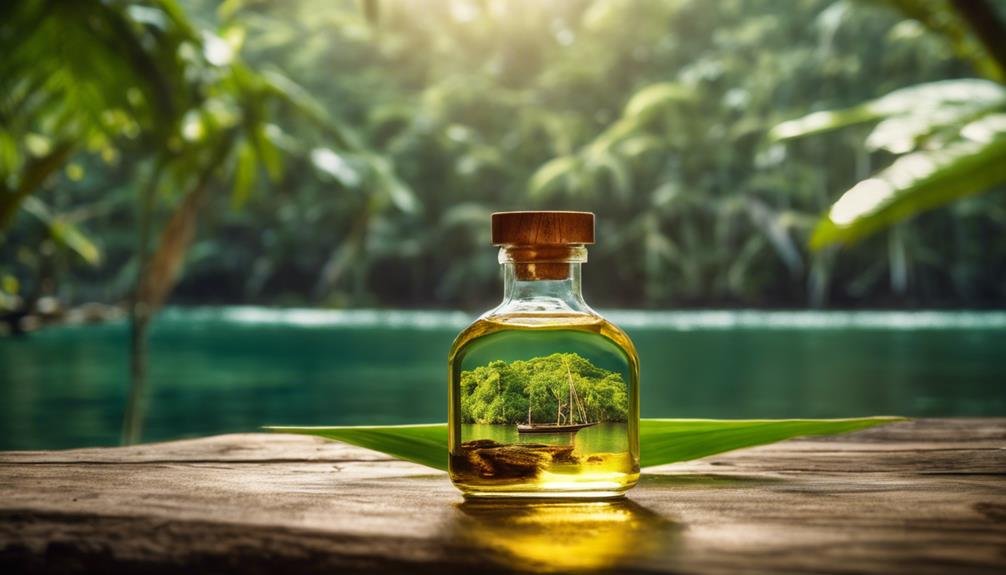You might wonder why batana oil from Honduras has garnered such a prestigious reputation globally. Often regarded as a hidden gem in the world of natural oils, its unparalleled moisturizing capabilities stem from a unique, traditional extraction process practiced by the Miskito people. This method not only preserves but enhances the oil's rich composition of antioxidants and fatty acids, distinguishing it sharply from other cosmetic oils. As you explore the depths of its origins and benefits, consider how a substance so simple yet so powerful might revolutionize not only your personal care routine but also contribute to sustainable practices in the beauty industry. How does batana manage to stand above the rest? Let's find out.
Key Takeaways
- Batana oil is traditionally extracted using sustainable, artisanal methods from the native Elaeis oleifera palm in Honduras.
- Rich in essential fatty acids, carotenoids, and lycopene, it deeply nourishes and protects hair and skin.
- The traditional cold pressing technique preserves its natural nutrients, aroma, and moisturizing properties.
- Ethical sourcing and fair trade practices ensure fair compensation and support for local Honduran communities.
- Batana oil's unique composition offers superior hydration and health benefits compared to other oils, ideal for thick, curly, or coarse hair.
Origins of Batana Oil
Batana oil, drawn from the nuts of the American palm tree Elaeis oleifera, originates from Central and South America. This unique oil from Honduras holds a special place in the hearts of the Miskito people, native to the region.
You might be intrigued to discover that batana oil isn't just another trendy ingredient; it's steeped in a rich history, used for centuries due to its remarkable properties.
The Miskito communities, primarily located along the Mosquito Coast of Honduras, have long celebrated batana oil for its ability to nourish and rejuvenate hair and skin. This isn't just about keeping up appearances; it's a deep-rooted part of their cultural heritage.
The fatty acids, including oleic and linoleic acids, make it exceptionally good at moisturizing, which is why you'll love how it makes your skin feel refreshed and your hair look revitalized.
As word of its benefits has spread, thanks to social media, batana oil has surged in popularity. Now, it's not just the Miskito people who can testify to its effects but a global audience enthusiastic to incorporate natural, effective products into their beauty regimen.
Consider this your introduction to a tradition that has found its way around the world, starting from the lush landscapes of Honduras.
Unique Extraction Process
As you explore the making of batana oil, you'll find that the traditional harvesting techniques are integral to its purity.
This oil is cold pressed, a method that guarantees you're getting the most natural and nutrient-rich product.
Each step, from collection to pressing, is meticulously handled by local artisans, preserving the oil's beneficial properties and distinct aroma.
Traditional Harvesting Techniques
Delving into the traditional harvesting techniques employed by indigenous communities in Honduras reveals a meticulous hand-extraction process that not only preserves the natural qualities of batana oil but also enhances its purity. You'll find that this unique method starts with roasting the nuts from the American palm tree. It's not just about heating them up; it's about revealing the rich, smoky flavor that sets batana oil apart.
By sticking to these age-old methods, the communities guarantee the oil retains its high quality. It's a labor of love, requiring skills passed down through generations. Here's what makes the traditional harvesting techniques so special:
| Step | Description |
|---|---|
| Roasting | Nuts are slowly roasted to release oils and flavors. |
| Hand-Extraction | Skilled hands squeeze out the oil, preserving nutrients. |
| Knowledge Transfer | Techniques handed down to guarantee consistency and quality. |
| Sustainability | Practices protect the palm population and local economy. |
| Quality Control | Each batch is monitored for the highest quality standards. |
Cold Pressed Purity
You'll be fascinated to learn about the unique cold-pressed extraction process used to obtain batana oil. This method guarantees that the oil maintains its natural, potent properties, making it a superior choice for your hair and skin care routines.
By fermenting the nuts of the American palm tree for several days, the oil extracted isn't only richer but also denser and creamier than its counterparts like coconut or argan oil.
The cold pressing technique is essential as it preserves high levels of essential fatty acids—oleic, palmitic, linoleic, and stearic. These acids are crucial for promoting moisture retention in the hair and scalp, offering you a deeply nourishing experience.
Unlike other processes that might strip away beneficial elements, cold pressed purity means Batana oil is less processed and free from chemical additives.
Opting for Pure Batana Oil guarantees you're using a product that's both effective and environmentally kind.
Plus, its distinctive earthy aroma is a tell-tale sign of its authenticity and unrefined quality, setting it apart from more processed oils.
Embrace this pure, natural solution and witness the transformative benefits of Batana oil yourself.
Composition and Properties

You'll find batana oil's unique nutritional profile especially intriguing as it's denser and packed with more nutrients compared to more common oils like coconut or argan.
Its rich fatty acid content, including oleic and linoleic acids, deeply hydrates and nourishes your hair, enhancing its natural shine and strength.
Additionally, the antioxidant effects from carotenoids like beta-carotene protect your scalp from oxidative stress, promoting overall hair health.
Unique Nutritional Profile
Batana oil boasts a unique nutritional profile that sets it apart from other natural oils like coconut and argan.
It's specially equipped to tackle the needs of damaged hair, thanks to its rich composition in essential fatty acids. These fatty acids are key to maintaining and enhancing moisture retention, which is vital if you're dealing with dry or brittle strands.
What's more, batana oil doesn't just stop at moisturizing. It also contains carotenoids, including alpha and beta carotenes, which are fantastic for promoting scalp health.
These components aren't just good for your skin; they also offer antioxidant benefits, protecting your hair and scalp from environmental stressors.
Furthermore, the presence of lycopene in batana oil adds another layer of protection against oxidative damage, making this oil a powerhouse in combating the harsh effects of pollutants and sun exposure.
Its denser composition is particularly beneficial if you have thick, curly, or coarse hair, as it penetrates deeply and nourishes from within.
This not only improves your hair's texture and shine but also contributes considerably to its overall health.
With batana oil, you're not just caring for your hair; you're reviving it.
Rich Fatty Acid Content
Delving into the rich fatty acid content of batana oil reveals why it's so effective for hair care. This luxurious oil is packed with essential fatty acids like oleic, palmitic, linoleic, and stearic acids. These aren't just fancy names; they're the powerhouse behind batana oil's deep moisturizing properties.
You'll find the high oleic acid content especially beneficial, as it helps the oil penetrate your hair shaft more effectively. This means you get deep nourishment and a noticeable improvement in your hair's texture.
Moreover, linoleic acid isn't just a supporting player. It's key in strengthening your strands, reducing breakage, and fostering healthier hair over time. If you've struggled with dry, brittle, or damaged hair, batana oil could be your new go-to solution.
Ideal for those with thick, curly, or coarse hair, batana oil delivers intense hydration without leaving a greasy residue.
Antioxidant Effects
After exploring the rich fatty acid content of batana oil, let's examine its potent antioxidant effects. You'll find that this remarkable oil is packed with antioxidants like carotenoids and lycopene, which shield your hair and scalp from the oxidative damage caused by free radicals.
These antioxidants aren't just protective; they also enhance the liveliness of your hair, ensuring it grows healthier and more resilient.
The presence of oleic, palmitic, and linoleic acids doesn't just contribute to its moisturizing prowess; it also plays a significant role in maintaining moisture. This is essential for keeping your scalp hydrated and in prime condition for healthy hair growth.
When you apply batana oil regularly, you're not just applying a product; you're engaging in a ritual that maintains the moisture levels in your hair and scalp, leading to improved texture and shine.
Furthermore, the antioxidants in batana oil help reduce inflammation and boost blood circulation to the hair follicles. This not only promotes healthier hair growth but also aids in the repair of damaged hair and skin by neutralizing harmful radicals and fostering a balanced growth environment.
Comparing Batana With Other Oils
When comparing batana oil to other popular hair care oils, it's clear that its unique properties offer distinct advantages. You'll find that while coconut oil is praised for its lightweight feel and rapid absorption, batana oil steps up with a denser, richer texture. This makes it a powerhouse for providing deep hydration and nourishment, especially if you've got thick, curly, or coarse hair.
It's packed with fatty acids like oleic and linoleic, which are crucial for robust hair health. Unlike the glossy finish that argan oil imparts, batana oil goes beyond just making your hair shine. It's loaded with carotenoids and lycopene, promoting not only the look but also the health of your scalp.
Plus, its antioxidants are a bonus, tackling the liveliness of your hair from the root. Now, let's talk about hair growth and hair loss—areas where batana really shines. Other oils, such as jojoba and sweet almond, are certainly beneficial, but batana oil is exceptional in minimizing hair loss and encouraging new hair growth.
Its unique composition supports robust hair follicles, so you're not just treating your hair, you're transforming it from the scalp up.
Proven Hair Health Benefits

Now that you've seen how batana oil compares favorably to other oils in promoting hair growth and minimizing hair loss, let's explore its proven hair health benefits more closely.
This remarkable hair oil is packed with essential fatty acids like oleic and linoleic, which are key to locking in moisture. You'll find that with regular use, your hair doesn't just retain hydration better; it actually becomes softer and shiner.
What's more, the carotenoids, including alpha and beta carotenes, boost scalp health greatly. They provide a shield against oxidative stress which often leads to hair weakening and loss. You'll notice your scalp feels healthier, which is vital for robust hair growth.
And don't overlook the power of lycopene in batana oil. This potent antioxidant plays an important role in protecting your hair follicles from environmental and chemical damage.
If you're tired of dealing with split ends, batana oil could be your savior. Its moisturizing properties help prevent the breakage that often leads to split ends.
Users have reported a noticeable improvement in texture and an increase in hair's overall health within just weeks. Isn't it time you gave your hair the care it deserves?
Versatile Applications
Batana oil's multifunctionality extends beyond just hair care; it's also a powerhouse for skin health. You'll find that this remarkable oil tackles a variety of beauty issues, from dry skin and blemishes to hair loss. By incorporating batana oil into your routine, you're not just using any oil; you're investing in a versatile, all-in-one solution.
For your hair, batana oil can be a game changer. Apply it as a pre-wash treatment to protect and nourish your locks, or leave it in overnight for deep conditioning. You'll notice your hair feels healthier and more resilient. Mixing batana oil with your favorite masks and conditioners enhances their effectiveness, infusing your hair with essential moisture and nutrients.
Don't overlook its benefits for your skin either. The oil's rich fatty acids and vitamins act as a powerful emollient, deeply hydrating and repairing your skin.
For an added boost, try massaging it into your scalp. This not only promotes hair growth by improving blood circulation but also guarantees that your scalp stays nourished and healthy. Embrace the versatility of batana oil and make it a staple in your beauty regimen.
User Testimonials and Reviews

Across the board, users rave about the transformative effects of batana oil on their hair and skin. You'll find countless reviews emphasizing how this oil has revolutionized their hair care routines.
Imagine experiencing noticeable improvements in your hair's growth and texture just weeks after starting regular use. It's not just about faster growth; many are pleased with the product for reducing hair breakage and boosting shine, enhancing your hair's liveliness and resilience.
However, it's not all immediate perfection. Some folks initially faced hair loss, a proof of the need for patience and consistency before the benefits kick in. But once they do, you're likely to be just as pleased with the product as others.
The oil's rich, creamy texture is frequently highlighted in reviews. While its earthy scent mightn't be everyone's favorite, the benefits often outweigh this minor drawback.
Beyond just being one of the best hair products out there, batana oil is a champion for skin care too. Users also share how it soothes scalp issues and improves skin hydration, making it a versatile addition to your beauty regimen.
Challenges in Production
Facing the production of Batana oil involves significant challenges, primarily because it's a labor-intensive process. You're dealing with a scenario where traditional methods dictate the pace and outcome of production. This can be both a blessing and a curse.
Here's what you're up against:
- Manual Extraction: The process often requires manual labor, which isn't only time-consuming but also physically demanding. This means longer hours and more strain on workers.
- Environmental Factors: Deforestation and climate change are real threats that affect the growth of American palm trees. These factors can lead to less predictable yields each year.
- Limited Technology: Without modern technology, maintaining consistent quality and efficiency in Batana oil production becomes a challenge. It's tough to keep up with demand when you're working with outdated tools.
- Skill Variability: Since the production techniques are passed down through generations, there's significant variability in quality and yield. The skill level of individual producers can greatly influence the final product.
As you navigate these challenges, remember that each hurdle impacts not just the production but also the livelihood of local communities involved in crafting Batana oil.
Sustainability and Ethical Sourcing

As you explore the world of batana oil, you'll find that eco-friendly harvesting practices aren't just beneficial for the environment but are central to the sustainability of this industry.
By adhering to fair trade standards, producers guarantee that the local communities in Honduras are fairly compensated, fostering economic stability and growth.
These ethical practices not only support the preservation of cultural heritage but also promote a healthier ecosystem.
Eco-Friendly Harvesting Practices
Batana oil production sets a remarkable standard for eco-friendly harvesting, actively involving local communities in Central and South America to guarantee not only environmental sustainability but also fair labor practices.
You'll find that the methods used in obtaining batana oil aren't just about making a profit; they're about preserving the land and uplifting the people who work it.
Here's what makes batana oil harvesting stand out:
- Sustainable Harvesting: The nuts of the American palm trees are collected in ways that don't harm the environment, ensuring that these essential resources remain available for generations.
- Eco-Friendly Practices: No harmful pesticides or chemicals are used in the cultivation of these palms, helping maintain the region's biodiversity.
- Community Involvement: Local communities are integral to the harvesting process, ensuring they receive fair wages and that their livelihoods are supported.
- Reforestation Efforts: The sustainable harvesting techniques contribute directly to reforestation projects, combating deforestation in these lush areas.
Fair Trade Compliance
While you enjoy the benefits of batana oil, it's crucial to recognize how fair trade compliance enhances both sustainability and ethical sourcing. When you choose batana oil from Honduras, you're not just buying a product; you're supporting fair trade practices that provide fair wages and promote ethical sourcing. This commitment guarantees that the local communities thrive economically while maintaining their traditional methods. In addition to its ethical sourcing, batana oil is also known for its nourishing properties for hair and skin. It’s no wonder why it’s one of the most popular ingredients in Dr. Truth Batana Oil. This oil has been cherished for generations for its ability to moisturize, repair, and protect, all while promoting sustainable and ethical practices. By choosing Dr. Truth Batana Oil, you’re not only investing in your own wellness but also in the well-being of the communities that produce it.
Here's how fair trade compliance makes a difference:
| Aspect | Benefit | Impact |
|---|---|---|
| Fair Wages | Guarantees equitable pay for farmers and harvesters | Economic stability for families |
| Education | Access to schooling for community children | Long-term community development |
| Healthcare | Improved facilities and access to medical care | Enhanced quality of life |
| Environment | Sustainable harvesting practices | Preservation of biodiversity |
| Transparency | Clear supply chain visibility | Consumer trust in product integrity |
Future of Batana Oil Industry
The future of the batana oil industry looks promising as global demand for natural and organic hair care products continues to rise.
You're witnessing a revolution in hair care that centers around sustainability and efficacy, where batana oil is becoming a superstar. Known for its enriching properties and pivotal role in clean beauty, this precious oil is harvested from palm trees in Honduras, supporting local communities while providing you with top-tier hair solutions.
Here's why you'll want to keep an eye on batana oil:
- Market Expansion: Projections show that batana oil's popularity isn't just a trend—it's set to grow substantially as more consumers demand natural products.
- Social Media Influence: Platforms like Instagram and TikTok are buzzing about batana oil, driving awareness and desire for products featuring this ingredient.
- Sustainable Sourcing: Efforts are intensifying to harvest batana oil responsibly, preserving natural habitats and ensuring fair compensation for local farmers.
- Research and Innovation: Ongoing studies aim to reveal even more benefits, potentially expanding batana oil's use beyond hair care into skin care, enhancing its market footprint.
As you dive deeper into the world of natural beauty, batana oil is a gem you won't want to overlook.
Frequently Asked Questions
Which Is the No 1 Hair Oil in World?
You're probably wondering which hair oil ranks as the best globally.
While many options exist, natural haircare enthusiasts often lean towards oils rich in nutrients that offer extensive hair oil benefits.
These oils deeply nourish, protect, and enhance hair health.
Look for ones packed with fatty acids, antioxidants, and natural hydrating properties to guarantee you're giving your hair the top-tier treatment it deserves.
Always choose based on your specific hair type and needs.
Where Does Batana Oil Come From in Honduras?
Batana oil, celebrated for its batana benefits, originates from Honduras.
It's extracted traditionally by the indigenous communities who've perfected the art over centuries. This labor-intensive process involves roasting and pressing the nuts of the American palm tree, Elaeis oleifera.
You'll appreciate how this method preserves the oil's rich nutrients and moisturizing properties, making it a standout in natural beauty care.
Why Is Batana Oil so Expensive?
You're noticing the high cost of batana oil because it's not just any oil.
Its production costs are steep, largely due to the labor-intensive methods used to extract it, preserving its beneficial properties.
Additionally, sourcing challenges arise from its limited availability, as it's only found in certain parts of Central America.
These factors, combined with its rising popularity, considerably drive up its price.
How Do I Know if Batana Oil Is Real?
To determine if your batana oil is real, check for specific authenticity signs.
It should have a thick, creamy consistency and a distinct, earthy scent that fades quickly after application.
Verify the label states "100% Pure Batana Oil" and lacks additives like parabens or sulfates.
These characteristics not only confirm its authenticity but also guarantee you're getting the full batana benefits for your skin and hair.
Conclusion
As you explore the wonders of batana oil, you're tapping into centuries of tradition from Honduras. Its unique extraction and rich composition set it apart, making it a superior choice for hair health. Despite challenges in production and the need for sustainable practices, the future looks promising. Remember, by choosing batana oil, you're not just nourishing your hair—you're part of a global community valuing ethical sourcing and quality. Keep an eye on this remarkable oil!

